1 June, 2000
Land ho!
June 1, 2000
Thursday
We arrived back in St. John's yesterday at 1600 hours (4:00 p.m.). It was
strange to stand on dry land again. Even though I wasn't moving anymore, it
still felt as if I were on the ship swaying back and forth. What a weird
sensation!
Today Janice and I decided to go sightseeing with our roommate, Carol.
People told us that a huge iceberg had grounded in the harbor at Bay Bulls
just south of St. John's about a week ago. We didn't know if it was still
there, but we wanted to find out.
Our chances were good. Every year glacial ice on the west coast of Greenland
breaks off into the ocean. Huge chunks of the ice drift west with the
Greenland Current to the coast of Labrador where they are picked up by the
Labrador Current. Some of them get stuck in the bays along the coastline and
others continue to float south to Newfoundland. There are so many icebergs
of every imaginable size and shape that the area is known as "Iceberg
Alley".
We drove along the southern coast of the Avalon Peninsula for a half hour to
the village of Bay Bulls. The road is narrow and winding, with incredible
views of the rocky coastline. We kept our eyes peeled for the iceberg. Just
as we dropped down into the village, we spotted it!
It was beautiful! A huge rounded arch with a perfect doughnut hole carved
out of the middle. And there it sat, grounded right in the middle of Bay
Bullís Harbor, framed by a rocky headland on either side. We took out our
cameras and started snapping pictures. People walking by told us that the
iceberg would probably split in two very soon. The arch was too unstable to
stay that way for long.
By then it was noon, and we were getting hungry. We stopped at a restaurant
and chose a table with a view of the iceberg and the harbor. Just as we were
sitting down, the most amazing thing happened. The iceberg split in two! The
arch broke off and crashed into the ocean, sending spray gushing up into the
air like a geyser! A giant wave spread across the harbor from one headland
to the other like a grin as it rushed in towards the shore. The force of the
crash dislodged the iceberg from the bottom, and sent it careening towards
the headland on the left.
We gobbled down our lunches and drove out to the point where the iceberg had
landed. From there it was only a short hike to a spot where we had a perfect
view. We sat there for a long time, watching the icy giant change shape
before our eyes. The iceberg had probably been adrift for less than a year,
but the ice it was made from could have been more than 15,000 years old!
Tiny bubbles trapped in the ice made the berg look white. The water swirling
around the base was cobalt blue. As huge as the iceberg was, we knew that a
third of it was hidden beneath the water.
What a perfect day! And to top it off, on the way back home, we saw a herd
of caribou grazing on the side of the highway. Do you know another name for
caribou? I'll give you a hint: Santa depends on nine of them every year to
bring gifts to children around the world.
Question: Where is it that you can turn your back to the sea and face every
other person on the North American continent?
To find out, click on Janice's page:
Janiceís Entry
Today.
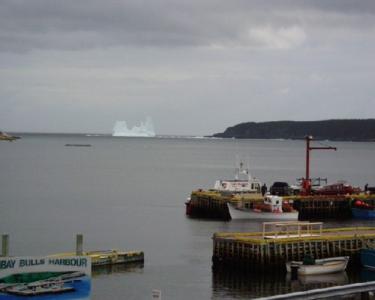
A few minutes later, the iceberg split! The hole's gone! What a wave there was from that?
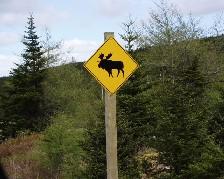
We saw signs for moose, but we didn't see any.
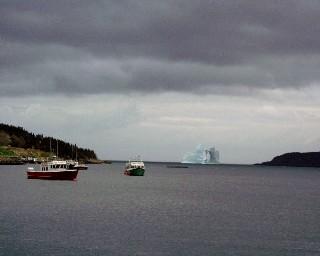
Tis is the grounded iceberg at Bay Bulls. Can you see the hole?
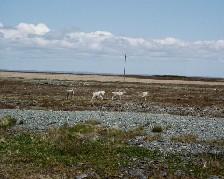
We saw a herd of white caribou near the souther shore of Newfoundland.
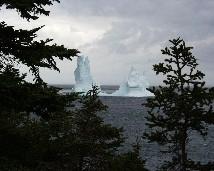
We watched the iceberg for a long time from a hillside with trees.
Contact the TEA in the field at
.
If you cannot connect through your browser, copy the
TEA's e-mail address in the "To:" line of
your favorite e-mail package.
|
